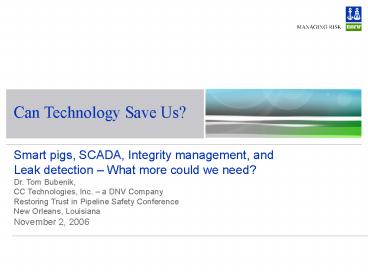Can Technology Save Us? - PowerPoint PPT Presentation
Title:
Can Technology Save Us?
Description:
Can Technology Save Us? Smart ... Restoring Trust in Pipeline Safety Conference New Orleans ... fatigue, fracture, overload, etc. Smart pigging magnetic ... – PowerPoint PPT presentation
Number of Views:110
Avg rating:3.0/5.0
Title: Can Technology Save Us?
1
Can Technology Save Us?
- Smart pigs, SCADA, Integrity management, and Leak
detection What more could we need?
Dr. Tom Bubenik, CC Technologies, Inc. a DNV
Company Restoring Trust in Pipeline Safety
Conference New Orleans, Louisiana November 2,
2006
2
Background and Qualifications
- 27 years of experience
- 2004-present CC Technologies, Director of
Integrity Services - 1990-2003, Battelle, Program Manager, Manager of
Pipeline Technology Center - 1979-1990, Exxon Production Research, Research
Scientist, - General Expertise
- Material properties
- Stress analyses, applied mechanics, post yield
behavior, fracture mechanics - Degradation mechanisms
- Inspection and monitoring technologies
- Failure modes and effects
- Risk analyses
- Specialized Expertise (Pipeline Related)
- Defect assessment corrosion, mechanical damage,
cracking, etc. - Degradation - stress corrosion cracking, fatigue,
fracture, overload, etc. - Smart pigging magnetic flux leakage,
ultrasonics, etc. - Repair selection, implementation
- Monitoring, etc.
3
Real World
We know about damage mechanisms but we dont
always know when or where degradation
occurs or about all factors that affect the
damage
We know how to find some types of damage but
we cant find everything nor can we learn
all there is to know about existing damage
4
Can Technology Save Us?
- Four key issues
- Mother nature
- Costs and benefits
- Technology
- Perfection
5
Can Technology Save Us?
- Mother nature is a wonderful equalizer. She
works diligently to undo what man creates. - We need to be continually vigilant. Problems
will never stop.
6
Can Technology Save Us?
- There is always a cost/benefit ratio.
- Everything has a price and there are trade-offs
between the activities we choose.
7
Can Technology Save Us?
- Technology has limitations.
- No technology, or combination of technologies,
does it all.
8
Can Technology Save Us?
- Nothing is perfect.
- All engineering materials have variations.
- We dont always know what we dont know.
- Were going to make mistakes.
9
The Question at Hand
- Can technology save us?
- From what?
- When?
- Where?
- How?
- At what cost?
- Etc.
10
Can Technology Save Us From What?
- The problems we know about and the problems we
dont - Threat identification and assessments are
essential. - We also need to look for problems that may be on
the forefront.
11
Can Technology Save Us When?
- Whenever we can, but not always
- Before people or the environment are
significantly threatened. - We need to understand how and when degradation
occurs.
12
Can Technology Save Us Where?
- Where people and/or the environment is
threatened - Risk assessments are important tools.
- We need to recognize all tools have limitations
and not rely on only one tool in the toolbox.
13
Can Technology Save Us How?
- With proven and evolving technologies
- Smart pigs, SCADA, Integrity management, and leak
detection - We need to strive to develop new and evolving
technologies even though they arent perfect.
14
Can Technology Save Us At What Cost?
- Cost/benefit ratios alone are not the answer.
They are the starting point. - We need to add the uncertainties and intangibles.
- We need to ask whether our plans are realistic,
reasonable, and rational.
15
Back to the Question at Hand
- Can Technology Save Us?
- Yes. Provided we know what problems we need to
address. - Yes. Provided we know when to apply the tools we
have. - Yes. Provided we look in the right places.
- Yes. Provided we use proven and evolving
technologies. - Yes. Provided we consider cost/benefit ratios
but not let them drive the process.
16
Can Technology Save Us?
- Technology can save us if we know how and where
to use it by - Continuing to develop an understanding of how
pipelines degrade and fail. - Developing and trying new technologies,
recognizing they will not be perfect. - Learning from our mistakes.
17
Lead, Follow, or Get Out of the Way Dont get
stuck in the middle!
18
Planning is important
19
As is balance
20
We Are Not In Over Your Head!































